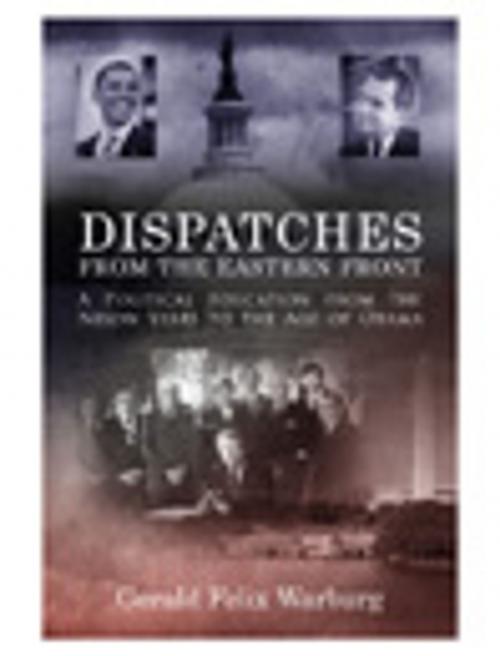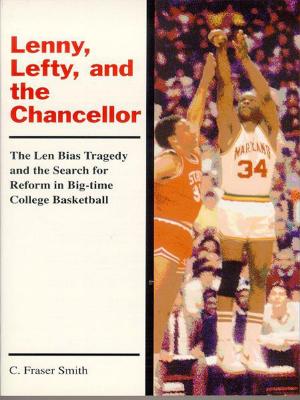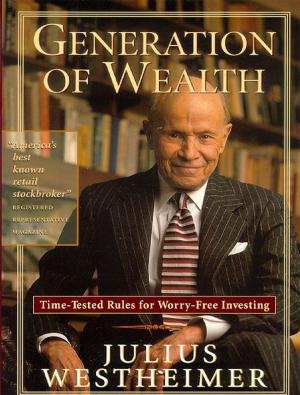Dispatches from the Eastern Front
A Political Education from the Nixon Years to the Age of Obama
Nonfiction, Social & Cultural Studies, Political Science, International, International Relations, Biography & Memoir, Political, Government| Author: | Gerald Felix Warburg | ISBN: | 9781610880879 |
| Publisher: | Bancroft Press | Publication: | March 15, 2014 |
| Imprint: | Language: | English |
| Author: | Gerald Felix Warburg |
| ISBN: | 9781610880879 |
| Publisher: | Bancroft Press |
| Publication: | March 15, 2014 |
| Imprint: | |
| Language: | English |
How does one arrive at a life in politics and policy? What happens to ones ideals when confronted with the reality that the only way to get things done in Washington is compromise? Who are the men and women who help shape our national agenda, and what drives their work? Dispatches from the Eastern Front provides fascinating, intensely personal, yet universal answers to these central questions.Recounting four decades inside Washington politics, Gerald Felix Warburg brings remarkable candor to a most unusual memoir. An idealistic California Baby Boomer transported to the intimidating world of Capitol Hill policymaking at a young age, Warburg finds himself working to reform nuclear energy, strategic arms control, and foreign policy. As his access and power grow, greater challenges loom: how to maintain principles while cutting deals, and how to balance public purpose with private interests. An eclectic career reveals the slow and often painful development of emotional intelligence for work at the highest reaches of the public arena.Dispatches takes readers inside the closed conference rooms in the U.S. Capitol where leaders strike legislative bargains, to the inner circles of presidential campaigns where advisors jockey for position, and to the firms where well-paid lobbyists use their expertise to advance the interests of corporations and NGOs. Up close and personal profiles of many of our current national leaders emerge. Cycles of action, followed by academic reflection, permit the type of introspection and insight rare in our national politics.With Dispatches from the Eastern Front, Warburg has crafted a highly literate memoir chronicling the political education of a generation, along the way offering a subtle but effective call to the young to enter the public arena. His sage advice tells how, and why, to construct a career in public service, with irrepressibly optimistic counsel that will make this book a political science standard for years to come.Gerald Felix Warburg is Professor of Public Policy and Assistant Dean of the Frank Batten School of Leadership and Public Policy at the University of Virginia. He teaches graduate school courses in national security policymaking and congressional strategy, and an undergraduate class in the public policy challenges of the twenty-first century. For many years, he served as a legislative assistant to the leaders of the U.S. House and Senate, where he played a lead staff role in advancing such measures as the Nuclear Non-Proliferation Act and other nuclear reform initiatives; the Comprehensive Anti-Apartheid Sanctions Act; the Support East European Democracy Act; and legislation for a mutual, verifiable U.S.-Soviet nuclear weapons production freeze.He staffed congressional leadership delegations to more than a dozen countries, and served as a consultant to the Nuclear Regulatory Commission and several U.S. presidential campaigns. Formerly executive vice president of Cassidy & Associates, a leading Washington public affairs firm, he taught previously at the University of Pennsylvanias Annenberg School of Communication, Georgetown Universitys Walsh School of Foreign Service, and the Stanford in Washington Program.His prior publications include Conflict and Consensus: The Struggle Between Congress and the President Over Foreign Policymaking (Harper); The Mandarin Club, a novel (Bancroft Press); two chapters on Congressional policymaking and lobbying in The National Security Enterprise: Navigating the Labyrinth (Georgetown Press); and “Nonproliferation Policy Crossroads: Lessons Learned from the U.S.-India Nuclear Agreement” in Contemporary Issues in U.S. Foreign Policy (CQ Press).A graduate of Hampshire College, with a graduate degree from Stanford University, Warburg was born and raised in the San Francisco Bay Area. He lives now in Virginia.
How does one arrive at a life in politics and policy? What happens to ones ideals when confronted with the reality that the only way to get things done in Washington is compromise? Who are the men and women who help shape our national agenda, and what drives their work? Dispatches from the Eastern Front provides fascinating, intensely personal, yet universal answers to these central questions.Recounting four decades inside Washington politics, Gerald Felix Warburg brings remarkable candor to a most unusual memoir. An idealistic California Baby Boomer transported to the intimidating world of Capitol Hill policymaking at a young age, Warburg finds himself working to reform nuclear energy, strategic arms control, and foreign policy. As his access and power grow, greater challenges loom: how to maintain principles while cutting deals, and how to balance public purpose with private interests. An eclectic career reveals the slow and often painful development of emotional intelligence for work at the highest reaches of the public arena.Dispatches takes readers inside the closed conference rooms in the U.S. Capitol where leaders strike legislative bargains, to the inner circles of presidential campaigns where advisors jockey for position, and to the firms where well-paid lobbyists use their expertise to advance the interests of corporations and NGOs. Up close and personal profiles of many of our current national leaders emerge. Cycles of action, followed by academic reflection, permit the type of introspection and insight rare in our national politics.With Dispatches from the Eastern Front, Warburg has crafted a highly literate memoir chronicling the political education of a generation, along the way offering a subtle but effective call to the young to enter the public arena. His sage advice tells how, and why, to construct a career in public service, with irrepressibly optimistic counsel that will make this book a political science standard for years to come.Gerald Felix Warburg is Professor of Public Policy and Assistant Dean of the Frank Batten School of Leadership and Public Policy at the University of Virginia. He teaches graduate school courses in national security policymaking and congressional strategy, and an undergraduate class in the public policy challenges of the twenty-first century. For many years, he served as a legislative assistant to the leaders of the U.S. House and Senate, where he played a lead staff role in advancing such measures as the Nuclear Non-Proliferation Act and other nuclear reform initiatives; the Comprehensive Anti-Apartheid Sanctions Act; the Support East European Democracy Act; and legislation for a mutual, verifiable U.S.-Soviet nuclear weapons production freeze.He staffed congressional leadership delegations to more than a dozen countries, and served as a consultant to the Nuclear Regulatory Commission and several U.S. presidential campaigns. Formerly executive vice president of Cassidy & Associates, a leading Washington public affairs firm, he taught previously at the University of Pennsylvanias Annenberg School of Communication, Georgetown Universitys Walsh School of Foreign Service, and the Stanford in Washington Program.His prior publications include Conflict and Consensus: The Struggle Between Congress and the President Over Foreign Policymaking (Harper); The Mandarin Club, a novel (Bancroft Press); two chapters on Congressional policymaking and lobbying in The National Security Enterprise: Navigating the Labyrinth (Georgetown Press); and “Nonproliferation Policy Crossroads: Lessons Learned from the U.S.-India Nuclear Agreement” in Contemporary Issues in U.S. Foreign Policy (CQ Press).A graduate of Hampshire College, with a graduate degree from Stanford University, Warburg was born and raised in the San Francisco Bay Area. He lives now in Virginia.















